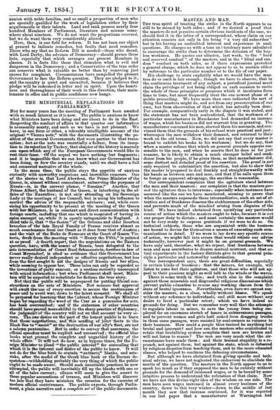THE MINISTERIAL EXPLANATIONS IN PARLIAMENT.
Nor for many:years has the meeting of Parliament been awaited with so much interest as it is now. The public is anxious to know what Ministers have been doing and are about to do in the East. -Respecting the' eonduct of affairs itrthat quarter our information is necessarily scanty, and such as we have is not pleasant. We have, in one form or other, a tolerably intelligible, account of the originel Vienna.note," with the documents illustrating the .po- fifties of the several Governments that were parties r to-that trans- action ; but as the note was essentially- a-failure, from its incep- tion to its rejection by Turkey, that chapter of the history is scarcely one upon which.any of the European': Governments would like to rest their fame. Of the sequel we have nothing'but fragments ; and it is impossible that we can know what our Government has -been. doing, or how the country stands, until we shall have afull 'and connected narrative of the whole.
- In'the mean time, the public stays the appetite of anxious ,ouriosity with unworthy suspicions and incredible rumours. One of the stories is, that Lord Aberdeen, the- Prime Minister of the Queen, is. almost without concealment, subserving the purposes of Russia—is in the 'current phrase, 4' Russian! Another, that Prince Albert, the husband of the Queen, is interfering in the af- fairs of the Executive; is not only attending on his Sovereign Lady- at the-meetings of her Council, but is using his influence to zontrol the advice of the responsible advisers ; and, while exer- cising his opportunity to be present at the meeting of the Queen with her Ministers, is in constant and:-direct communication with foreign courts; including that one which is suspected of having its spies amongst u,-while it -is- openly antagonistic to .England. A third tale is, ihkt.u,the fusion Of the Orleans and elder Bourbon branches of theltite Royal Family of -Frain* receives almost as much countenance froni our Court as it -does fronethat of-Austria and the visit of the Iluke de Nemours-at the Oourt fit Oaten' 'Vic; toria, fresh from the -me,etingwith Henry the Fifth," is pointed at as proof. A fourth.report, that the negotiations- on the 'Eastern question, have, with the assent of Russia, been delegated to the sole intermediation -of Count Buol-Schauenstein,-brother-in-law of Count Meyendorf, is cited as evidence that this' Government has never really desir611 independent or effective negetiations, but has from the first sought to aid the designs of 'Russia and her allies, while seeming to oppose her. These tales can only he regarded as the inventicas of party rancour, or a restless curiosity unoccupied with sound information; but when Parliament shall meet, Millie; tors will be expected to substitute for fictions the true story. Not thatthe-pubilic will be unprepared for putting liberal eon- structions on the acts of Ministers. Not censure - but approval will await thiruse of every exertion to secure the bontinuanee of peace and to avoid war, down to the latest moment: We shall all be prepared for learning that the Cabinet, whose Foreign Minister began by regarding the word of the Czar as a guarantee for acts, has been overreached; and 'if the statesmen of other countries should have proved moreakilful in the sharp practice of diplomacy; the judgment of the -country will not On that account be very se- vere. The one desire on the part of the honest public is to learn that thesetmegotiations, and this sending of joint -fleets to the Black Sea-'to "assist" at the destruction of our ally's fleet, are.not a solemn pantomime. But in order to convey that assurance, the official speeches must be explicit and unreserved ; the official blue books must present the complete and ungarbled history of the whole affair' . It wfil not -do -now, as-in bygone times', for the Fo- reign Minister to plead --44 the public interest for concealing that which it is the interest and desire of the public to know. It will not do for the blue book to contain extracts,' blanks, and aste- risks, after the model of the Greek blue book 'or the 'Burnes -de, spatches—withholding probably the very thing of which the public ought to be made aware. Should such unsuitable practices be now attempted, the public will inevitably fill up the blanks with one or all of -the tales current ; silence will seem to give the assent to these popular accusations of treason and Ministers will discover too late that they have mistaken the occasion for the exercise of modern official contrivances. The public expects, through Parlia- ment, a plain 'narrative and a complete set of the public documents.






















































 Previous page
Previous page